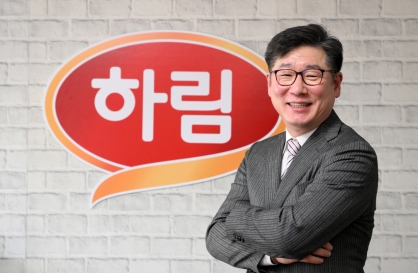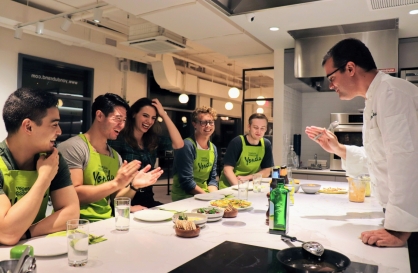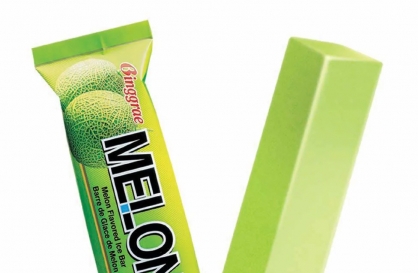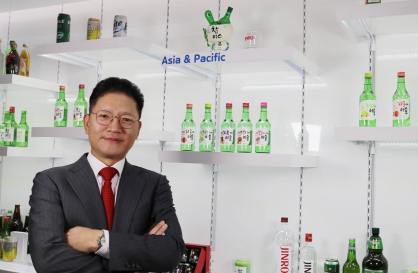Most Popular
K-Food
[K-Food] Binggrae taps into niche markets with K-snacks
More than 10% of sales come from overseas markets, led by top two bestsellers – Banana Flavored Milk and Melona Ice Cream
By Lee Yoon-seoPublished : April 4, 2023 - 14:01

This is the fifth installment of a series of interviews with global business chiefs of South Korean food companies that are expanding aggressively in overseas markets. -- Ed.
Korean snacks, which have survived a saturated market at home by gaining the approval of one of the most gastronomic and difficult-to-please consumers in the world, are making aggressive inroads into overseas markets in a bid to further tempt global consumers' palates.
“In order for Korean snacks to successfully foray into global markets, snacks should attempt to target a niche, with fun packages that grab consumers' attention,” said Kwon Ji-young, general manager of overseas sales team at Binggrae, the nation’s largest snack maker with annual sales of 1.2 trillion won ($914 million) as of 2022.
Last year, about 11 percent of Binggrae's total sales, which amount to 140 billion won, came from overseas. According to the company, its annual global sales have risen by 16 percent over the course of five years, from 2018 to 2022.
Binggrae says this achievement comes as the company's strategy to aim to target the unexplored area in the global snack markets yielded fruitful results.
For example, Melona, the company's series of fruit-flavored ice cream, fared well in the US market with its characteristically creamy and chewy texture, according to Kwon.
"Most of the fruit-flavored ice creams in the US market are sherbet style. Consumers are not used to fruity soft serve ice creams – and Melona has appropriately tapped that (blue ocean) market," said Kwon.
Melona alone has recorded annual overseas sales of some 45 billion won as of last year, and currently stands as Binggrae's No. 2 bestselling product in the overseas market, behind Banana Flavored Milk.
Appealing packaging is key
Kwon says the marketing strategy to promote product packages in an appealing manner resonated well with global consumers as well.
For example, Binggrae accentuated the color yellow in its flagship product Banana Flavored Milk in the Chinese market, which contributed to ramping up its sales. The company realized that Chinese consumers had a preference for purchasing yellow products, as the color reminds them of gold.
Fueled by the K-pop craze around the world, Banana Flavored Milk is the company's No. 1 global bestselling product, with some 60 billion won in overseas market sales alone.
For its plans going forward, Kwon said Binggrae is aiming to ramp up its global sales by focusing on the US, China and Vietnamese markets. In particular, she said the company will leverage Vietnam's geographic location as a hub for foraying into neighboring Southeastern Asian countries.
"The credibility of products made in Korea has soared over the past few years," Kwon said.
With Korean dramas and platforms like YouTube functioning as tools for global consumers to get closer to Korean content, there are more opportunities for Korean goods to reach global consumers than ever, and Korean companies should take advantage of it, she said.


![[Herald Interview] 'Korea, don't repeat Hong Kong's mistakes on foreign caregivers'](http://res.heraldm.com/phpwas/restmb_idxmake.php?idx=644&simg=/content/image/2024/11/13/20241113050481_0.jpg&u=20241113223419)
![[KH Explains] Why Yoon golfing is so controversial](http://res.heraldm.com/phpwas/restmb_idxmake.php?idx=644&simg=/content/image/2024/11/13/20241113050608_0.jpg&u=)


















![[Herald Review] Cho Seung-woo takes 'Hamlet' crown](http://res.heraldm.com/phpwas/restmb_idxmake.php?idx=652&simg=/content/image/2024/11/14/20241114050593_0.jpg&u=20241114162458)
![[Today’s K-pop] NewJeans reaches 200m views with ‘Hype Boy’ music video](http://res.heraldm.com/phpwas/restmb_idxmake.php?idx=642&simg=/content/image/2024/11/14/20241114050657_0.jpg&u=)